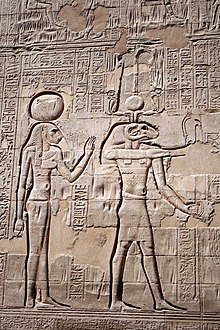Menhit: Difference between revisions
Citation bot (talk | contribs) Alter: url, pages. URLs might have been anonymized. Formatted dashes. | Use this bot. Report bugs. | #UCB_CommandLine |
Netjerudua (talk | contribs) No edit summary Tags: Visual edit Mobile edit Mobile web edit |
||
| Line 6: | Line 6: | ||
| hiero = <hiero>mn:n-H-i-i-t-I12</hiero> |
| hiero = <hiero>mn:n-H-i-i-t-I12</hiero> |
||
| caption = Menhit on the left with Khnum on the right, shown on the outside wall of the temple at [[Esna]] |
| caption = Menhit on the left with Khnum on the right, shown on the outside wall of the temple at [[Esna]] |
||
| god_of = |
| god_of = Nubian Lioness Goddess Of War, and The Sun |
||
| equivalent1 = [[Bastet]] |
| equivalent1 = [[Bastet]] |
||
| equivalent1_type = Egyptian |
| equivalent1_type = Egyptian |
||
| Line 13: | Line 13: | ||
| equivalent3 = [[Inanna]] |
| equivalent3 = [[Inanna]] |
||
| equivalent3_type = Mesopotamian |
| equivalent3_type = Mesopotamian |
||
| offspring = [[Heka (god)|Heka]] |
|||
| consort = [[Khnum]] |
|||
}} |
}} |
||
'''Menhit''' {{IPAc-en|ˈ|m|ɛ|n|ˌ|h|ɪ|t}} (also known as '''Menhyt''', and '''Menchit''') was originally a [[Nubia]]n lion goddess of war in the [[Kingdom of Kush]], who was regarded as a [[Tutelary deity|tutelary]] and [[Solar deity|sun goddess]].<ref name="Wilkinson 179" /> Her name means either "she who sacrifices" or "she who massacres."<ref>Farid, Mona; Fekri, Magdi Mohamed; Abd-elaal, Magdi Ismail (Hesham Ezz-eldin). "[https://www.researchgate.net/publication/338839333_Archeological_Study_of_Wild_Animals_in_the_New_Kingdom Archeological Study of Wild Animals in the New Kingdom]". University of Sadat. ''ResearchGate''. Retrieved 2023-09-07</ref> As ''Menhit'', she is associated with the [[Solar deity|sun]], but as ''Mekhit'', she is associated with the [[Lunar deity|moon]].<ref name=":0">{{Cite web |last=Mark |first=Joshua J. |date=2016-04-14 |title=Egyptian Gods - The Complete List |url=https://www.worldhistory.org/article/885/egyptian-gods---the-complete-list/ |access-date=2023-09-03 |website=WorldHistory.org}}</ref> |
'''Menhit''' {{IPAc-en|ˈ|m|ɛ|n|ˌ|h|ɪ|t}} (also known as '''Menhyt''', and '''Menchit''') was originally a [[Nubia]]n lion goddess of war in the [[Kingdom of Kush]], who was regarded as a [[Tutelary deity|tutelary]] and [[Solar deity|sun goddess]].<ref name="Wilkinson 179" /> Her name means either "she who sacrifices" or "she who massacres."<ref>Farid, Mona; Fekri, Magdi Mohamed; Abd-elaal, Magdi Ismail (Hesham Ezz-eldin). "[https://www.researchgate.net/publication/338839333_Archeological_Study_of_Wild_Animals_in_the_New_Kingdom Archeological Study of Wild Animals in the New Kingdom]". University of Sadat. ''ResearchGate''. Retrieved 2023-09-07</ref> As ''Menhit'', she is associated with the [[Solar deity|sun]], but as ''Mekhit'', she is associated with the [[Lunar deity|moon]].<ref name=":0">{{Cite web |last=Mark |first=Joshua J. |date=2016-04-14 |title=Egyptian Gods - The Complete List |url=https://www.worldhistory.org/article/885/egyptian-gods---the-complete-list/ |access-date=2023-09-03 |website=WorldHistory.org}}</ref> |
||
Revision as of 17:13, 26 November 2023
| Menhit | ||||||||
|---|---|---|---|---|---|---|---|---|
Nubian Lioness Goddess Of War, and The Sun | ||||||||
 Menhit on the left with Khnum on the right, shown on the outside wall of the temple at Esna | ||||||||
| Name in hieroglyphs |
| |||||||
| Consort | Khnum | |||||||
| Offspring | Heka | |||||||
| Equivalents | ||||||||
| Egyptian equivalent | Bastet | |||||||
| Igbo equivalent | Anyanwu | |||||||
| Mesopotamian equivalent | Inanna | |||||||
Menhit ⫽ˈmɛnˌhɪt⫽ (also known as Menhyt, and Menchit) was originally a Nubian lion goddess of war in the Kingdom of Kush, who was regarded as a tutelary and sun goddess.[1] Her name means either "she who sacrifices" or "she who massacres."[2] As Menhit, she is associated with the sun, but as Mekhit, she is associated with the moon.[3]
History
Believed to have origins as a Nubian goddess, Menhit is always depicted as a lioness with solar disk and a uraeus symbol.[1][4] Coffin texts associate her with being a tutelary and solar deity.[1] Some sources identify her as the subject of the "Distant Goddess" myth. In one legend, the Eye of Ra flees from Egypt. Her counterpart, Ra, sends another god to track her down in Nubia, where she transforms into a lioness. When she is returned to Ra, she either becomes or gives birth to Menhit.[3]
She also was believed to advance ahead of the Egyptian armies and cut down their enemies with fiery arrows, similar to other war deities.[5] She was less known to the people as a crown goddess[6] and was one of the goddesses who represented the protective uraeus on royal crowns.[1]
Cults
In the 3rd Nome of Upper Egypt, particularly at Esna, Menhit was said to be the wife of Khnum and the mother of Heka. She was also known to be the mother of Shu.[7] She was also worshipped in Lower Egypt, where she was linked with the goddesses Wadjet and Neith.[1] She became identified with another lioness goddess, Sekhmet.[5]
References
- ^ a b c d e Wilkinson, Richard H. (2017). The Complete Gods and Goddesses of Ancient Egypt. Thames & Hudson. p. 179. ISBN 978-0-500-28424-7.
- ^ Farid, Mona; Fekri, Magdi Mohamed; Abd-elaal, Magdi Ismail (Hesham Ezz-eldin). "Archeological Study of Wild Animals in the New Kingdom". University of Sadat. ResearchGate. Retrieved 2023-09-07
- ^ a b Mark, Joshua J. (2016-04-14). "Egyptian Gods - The Complete List". WorldHistory.org. Retrieved 2023-09-03.
- ^ Budge, E. A. Wallis (2018-08-28). The Ancient Egyptian Book of the Dead: Prayers, Incantations, and Other Texts from the Book of the Dead. Crestline Books. ISBN 978-0-7603-6443-7.
- ^ a b Hans Bonnet: Menhit, in: Lexikon der ägyptischen Religionsgeschichte (English: Lexicon of Egyptian History of Religion) p.451f
- ^ Felde, Rolf (2017-12-29). Gottheiten, Pharaonen und Beamte im alten Ägypten (in German). BoD – Books on Demand. p. 34. ISBN 978-3-7460-4935-9.
- ^ Budge, E. A. Wallis (1920). An Egyptian Hieroglyphic Dictionary with an Index of English Words, King List and Geological List Vol. 1. London: John Murray. pp. 303–304.
Literature
- Rolf Felde: Ägyptische Gottheiten. Wiesbaden 1995
- Hans Bonnet: Lexikon der ägyptischen Religionsgeschichte, Hamburg 2000; ISBN 3-937872-08-6


